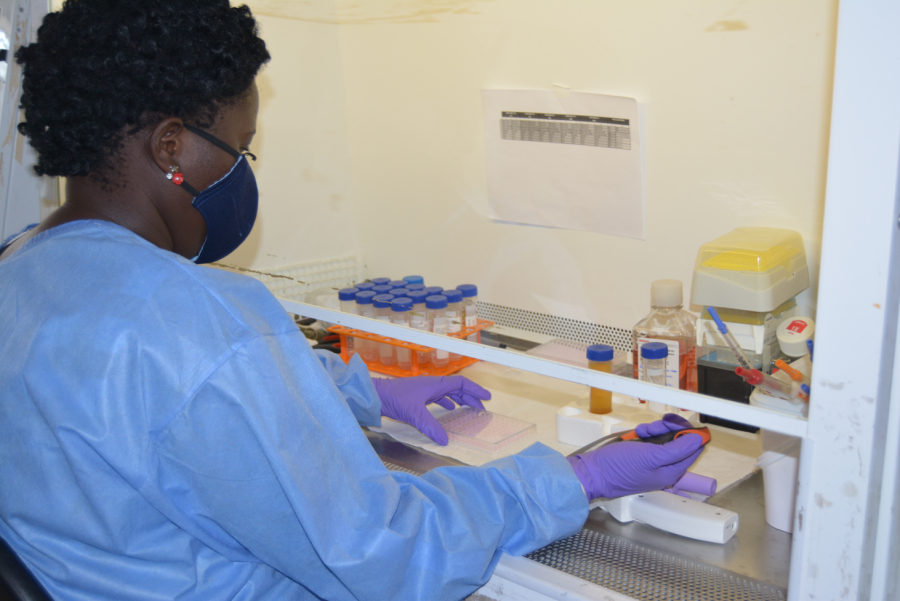
A scientist setting up experiments to a measure the amount anti-COVID protective antibodies in volunteer blood samples
With funding from Ugandan government, EDCTP and UK Research and Innovation, scientists at the MRC/UVRI and LSHTM Uganda Research Unit are conducting a massive study on the impact of Alpha, Beta, Delta and Omicron variants of the COVID-19 virus on Africans. The four-year long project, which started in Uganda with the confirmation of the first COVID case in March 2020 is premised on the fact that the African continent suffered the least fatalities as a result of the global pandemic.
Results from the study could give insights into the prevailing factors, and potentially offer recommendations on a way forward for scientists world-wide in the development of solutions that effectively incorporate indigenous factors in the development of solutions to future emergencies.
According to Dr. Jennifer Serwanga, a senior scientist in the Pathogen Genomics Phenotype and Immunity Programme (PGPI), initial tests uncovered a baseline of “very good antibodies” in Ugandans that laid a foundation for further studies into their correlation to healthy resistance to the virus. She says;
“We have been monitoring over 300 Ugandan COVID-19 survivors from a largely mild or asymptomatic infection for up to two years. Our specialists are currently analyzing their blood samples to possibly determine the quality and way of working of antibodies in Africans. Overall, the study will provide additional information to help researchers worldwide in understanding the unique features of our body immunity. The study will also describe how these antibodies develop and how long they last thus informing vaccination and booster intervals”..........Dr. Jennifer Serwanga
With sponsorship from the government of Uganda, the Unit has also signed a memorandum of understanding with Entebbe hospital and Masaka hospital to collect swab specimens for isolating viruses to develop the COVID19 vaccine for the country. Other partners include the International AIDS Vaccine Initiative (IAVI) and Makerere University. Representative stocks of the early predominant Ugandan strain (A23.1), Beta, Delta and Omicron have been produced for production of the vaccine. We have completed the inactivation of these stocks, purified the product to remove chemicals and are now in the final stages of purifying to remove all cellular proteins. Pre-clinical trials in mice will be starting soon in collaboration with colleagues at Makerere University.
Concurrently, the Unit has been fine-tuning tests to assess that vaccine induced antibodies are protective against the different strains of the COVID-19 virus circulating in the country. The Unit has also recruited students and strategic interns to build capacity for future epidemic preparedness.
If you enjoyed this article and would like to build a career in global health, we offer a range of MSc programmes covering health and data, infectious and tropical diseases, population health, and public health and policy.
Available on campus or online, including flexible study that works around your work and home life, be part of a global community at the UK's no.1 public health university.
